The first time I interviewed Matt Humphrey, we were driving in his pickup truck through southern British Columbia, passing fields and forests, only three miles from the U.S. border. Humphrey, then 31 years old, is a father of three and an evangelical Christian with a keen appreciation for the Bible. He is also an environmentalist, one who believes fighting climate change is a moral duty.
On the 18-acre property we were heading to, Humphrey and others from an evangelical Christian group called A Rocha (pronounced a-RAH-shah) were growing organic crops, running Bible workshops, and helping young people get out in nature to study species like salmon in a river that flowed through their land. It’s called the Brooksdale Environmental Centre, and Humphrey, 6-foot-3 with a broad smile, was its assistant director at the time. I’ve been in touch with Humphrey for a few years, and it was on our drive to Brooksdale that he first described his faith to me — and how it shaped his environmentalism.
“I don’t want to claim that Christianity gives the best understanding of the environment,” he said, “but for those who are claiming to be Christian, part of that discipleship involves a relationship with creation.”
Spend time with Christian environmentalists and you’ll hear the word “creation” a lot. It refers to the biblical story of Genesis, in which God created the world in seven days, forming the oceans and forests, plants and animals, before crafting the first humans. Evangelical Christians take the Bible more literally than most; yet they haven’t always been as serious about protecting what God made. Growing ranks of younger evangelicals, however, along with members of organizations like A Rocha, see themselves more as stewards, grounding their concern for nature and the planet in the Bible. They view their environmentalism as caring for creation. If God made the planet and all that’s in it, the reasoning goes, shouldn’t pains be taken to protect it?
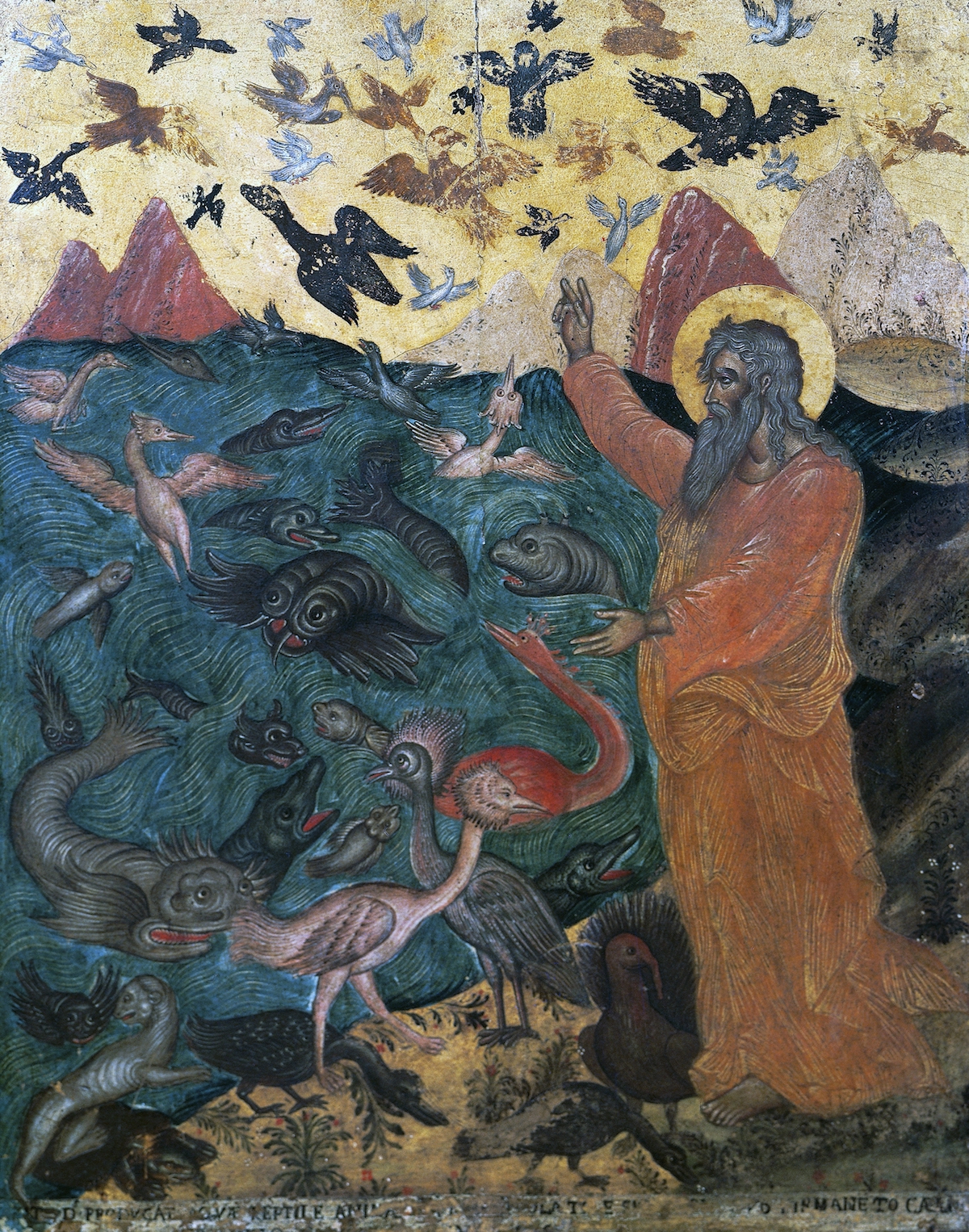
For most American evangelicals, the answer is far from clear. Around a quarter of Americans — 84 million — call themselves evangelical Christians. According to the Pew Research Center, a majority lean Republican and don’t buy the science behind man-made climate change. White evangelicals in particular are among the least likely to accept the science: Only 28 percent believe humans cause global warming. This has vast implications for politics as well as getting policies in place to tackle the growing crisis. Some 81 percent of white evangelicals in 2016 voted for Donald Trump, who then spent four years in the White House trying to tear down a half-century of environmental protections. In last year’s election, 75 percent of them wanted to give him another four years.
Humphrey grew up in Virginia’s Shenandoah Valley and moved to the coast to study at Christopher Newport University, a public, secular college in Newport News that drew many evangelical Christians from the region. “I went to college during the [George W.] Bush years,” he said, “when to be a Christian often meant having an American flag decal on your car.” Humphrey understood the evangelicals who doubted established science better than most, but when we caught up recently, he told me even he didn’t see 2016 coming. “I was frankly surprised by the success of Trump,” he said. Some friends back home expressed skepticism over his involvement with A Rocha and environmental issues. One told him that environmental groups were part of a sinister plot, led by Al Gore, to seize power.
Many younger evangelicals, however, are open to new ideas and appear to accept the scientific evidence. One Pew study found a majority of evangelical millennials support stricter environmental laws, and groups like Young Evangelicals for Climate Action are leading the charge.
Humphrey has straddled these two worlds — right-wing politics and evangelical environmentalism — and it provides him with a unique perspective, as well as a potential bridge. He’s part of a group of evangelicals who, with their embrace of mainstream science, conservation, and environmental protections, don’t fit the conservative stereotype.
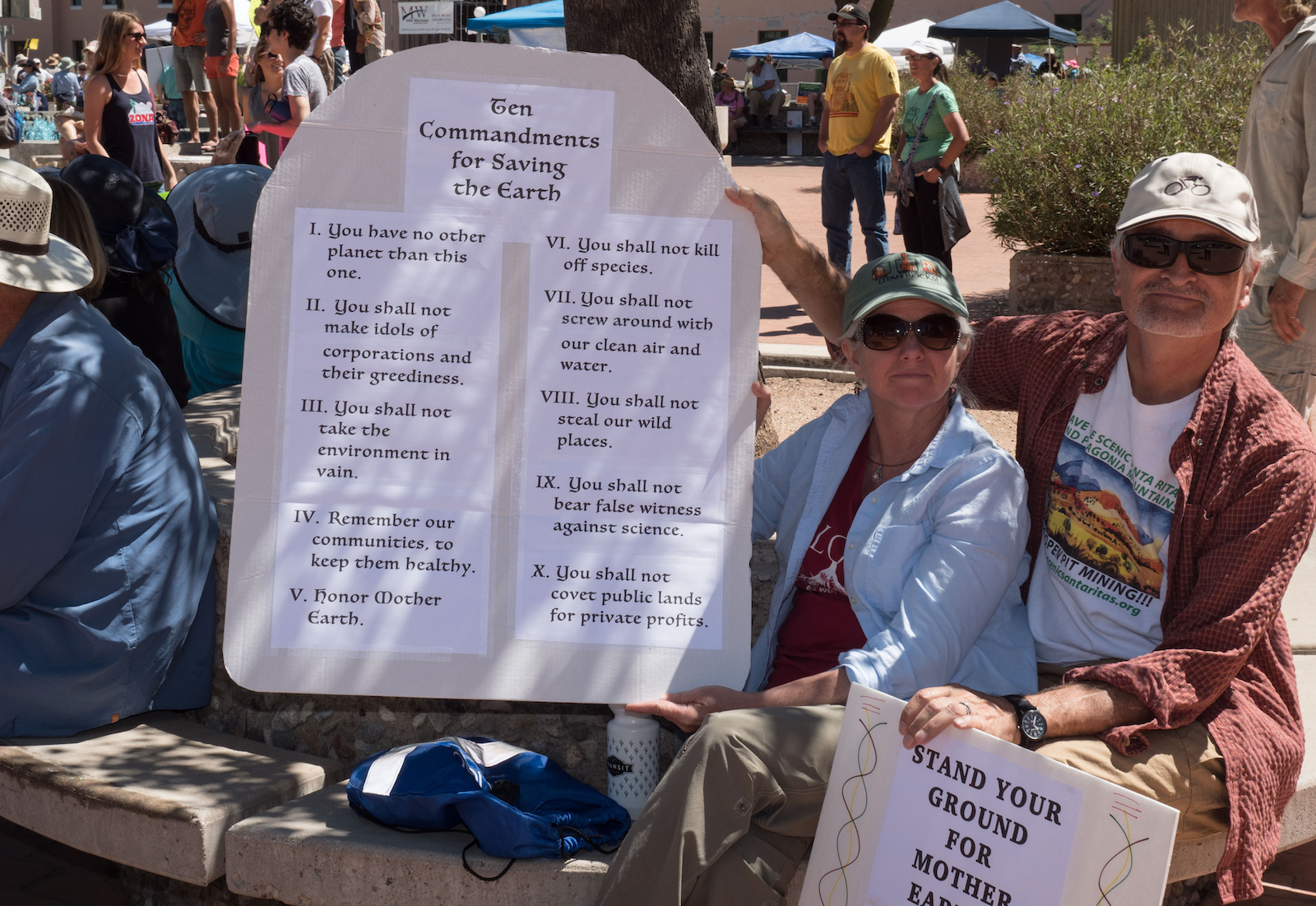
The definition of “evangelical” Christian isn’t always clear-cut. In popular usage, it includes Protestants who take the Bible very seriously, as much more than a collection of parables and ancient history. But it may also encompass those who emphasize the redemption of Jesus’s crucifixion, believe non-Christians need to be converted, and that faith shouldn’t be divorced from politics.
One thing many American evangelicals share is a skepticism of climate science for reasons that include theology, politics, and a hostility to the theory of evolution. Darwin’s theory, of course, suggested that humans evolved over millennia through natural selection and shared ancestors with modern apes, an idea which can’t be easily squared with a belief that the Book of Genesis is a fact-based origin story.
In 1925, the Scopes “Monkey” Trial in Dayton, Tennessee, pitted a high-school teacher and football coach, John Thomas Scopes, against the state, which had a law on the books that prohibited him from teaching evolution. The media coverage of the case cast fundamentalist Christians as backward and anti-intellectual. The jury found Scopes guilty, but evangelicals lost in the court of public opinion: The stigma stuck, and many grew even more skeptical of science and scientists.
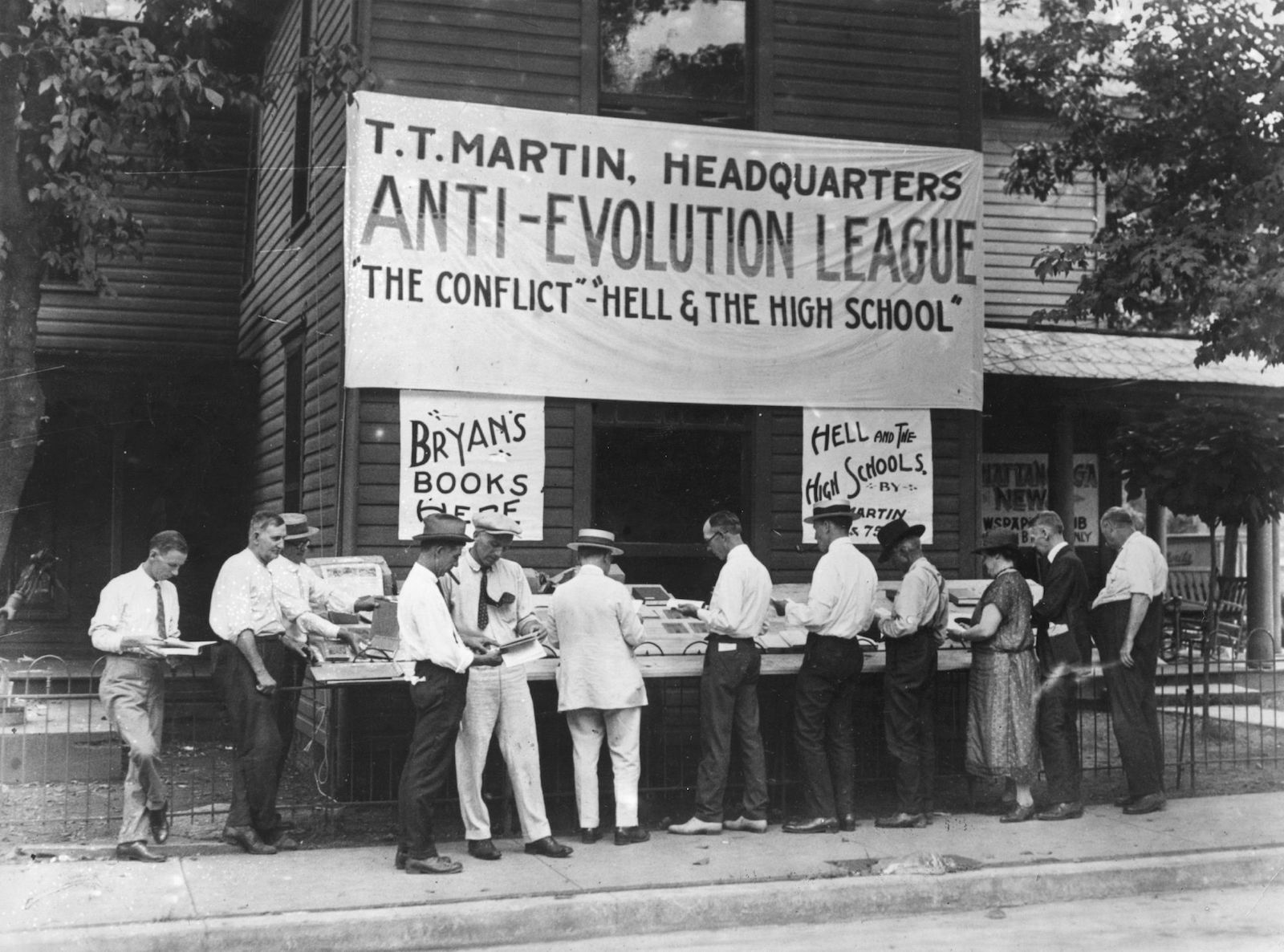
While Darwinism helps explain some American evangelicals’ aversion to science, it’s politics that best explains their aversion to climate science. In the 1980s, President Ronald Reagan promoted evangelical views in exchange for votes. In doing so, a decades-long alliance was formed. As evidence accumulated that humans were heating up the planet, that relationship meant evangelicals were in lockstep with Republicans when climate change became a charged partisan issue. In the early 2000s, a leading GOP strategist, Frank Luntz, wrote a now infamous memo advising the party and then-President George W. Bush to push the line that the consensus around climate change was still up for debate. “Should the public come to believe that the scientific issues are settled,” he wrote, “their views about global warming will change accordingly. Therefore, you need to continue to make the lack of scientific certainty a primary issue.” For many evangelicals, a hostility to climate science became a badge of identity. (Luntz, however, would later make an about-face.)
How strong are these political influences? For a large segment of evangelicals, “their statement of faith is written primarily by their politics, and only secondarily by their faith,” said Katharine Hayhoe, the prominent climate scientist and herself an evangelical Christian, who was named one of Time Magazine’s most influential people for her work bridging divides. “If the two come in conflict, they will go with their politics over what they claim to believe.”
But there remains a large segment of “theological evangelicals,” she told me, “whose statement of faith is written by the Bible.” Those are the people Humphrey wants to reach.
In 1967, the historian Lynn White Jr. published a short essay in the journal Science. “The Historical Roots of our Ecological Crisis” argued that the Christian worldview could be blamed for the rapid pace of environmental destruction. White wrote that the biblical story of creation gave Christians an impetus to dominate the land. Genesis, after all, called on people to “subdue” the Earth and to have “dominion over the fish of the sea, and over the birds of the air.” It was God’s will. White wrote that this dogma entrenched the idea that the natural world served no purpose “save to serve man’s purposes,” which influenced the development of modern technology and the ecological crisis it wrought.
White already saw climate change as a consequence of this worldview. “Our present combustion of fossil fuels threatens to change the chemistry of the globe’s atmosphere as a whole, with consequences which we are only beginning to guess,” he wrote.
The essay set off a debate that still burns today. Reams of papers were written for and against, it remains a staple on university reading lists, and it helped shape the field of environmental ethics. The essay also prompted soul-searching among some Christians, leading them to ask how they could embrace the growing environmental movement. “It really is amazing how influential these five pages from the journal of Science were,” Humphrey said, “and I think that’s because many of White’s arguments struck a chord.”
Over the next half-century, many Christians imbued their faith with a concern for the natural world. To counter the idea of “dominion,” they went back to the book of Genesis. The same story, they said, asked people to “work and take care of” the land, and to “let the birds increase on the earth.” Rather than interpreting the story of creation as a license to dominate, these Christians consider it a call to protect and steward the landscape.

A Rocha was founded in Portugal by two British evangelicals, Peter and Miranda Harris, in the 1980s. (A Rocha means “the rock” in Portuguese.) Near the estuary of the Ria de Alvor on the southern coast, home to 150 bird species, the Harrises collected data, conducted research, and protected a variety of birds. Today the organization they started has projects in more than 20 countries, including the United States, Lebanon, Uganda, and Peru.
In his 2008 book Kingfisher’s Fire, Peter Harris laid out the connection between his faith and the organization’s conservation efforts, an explanation rooted in both science and caring for God’s creation. “We believe our data can contribute to the survival of the habitats and species we are studying,” he wrote. “Our work for the care of nonhuman creation is important to its Creator.” A Rocha’s moderate evangelical culture also stems, in part, from its British roots, where the atmosphere is less politically charged compared to the United States.
Hayhoe, who has spoken at A Rocha’s events and acted as an advisor to the organization, thinks the Bible makes this responsibility clear. “If we really take the Bible seriously, we would be at the front of the line demanding climate action,” she said. “For somebody who is, at least, even partially a theological evangelical, who actually takes the Bible seriously, that is a huge point of connection.”
Over the years, Humphrey’s own environmental awareness increased through his work as a guide in British Columbia’s Coast Mountains, and by reading stories of ecological destruction in magazines like Orion and Mother Jones. Theology and the Bible also later shaped his environmental worldview. And one day, not far from the Brooksdale Environmental Centre, I visited the Columbia Bible College in Abbotsford to watch Humphrey give a presentation on what’s known as ecotheology.
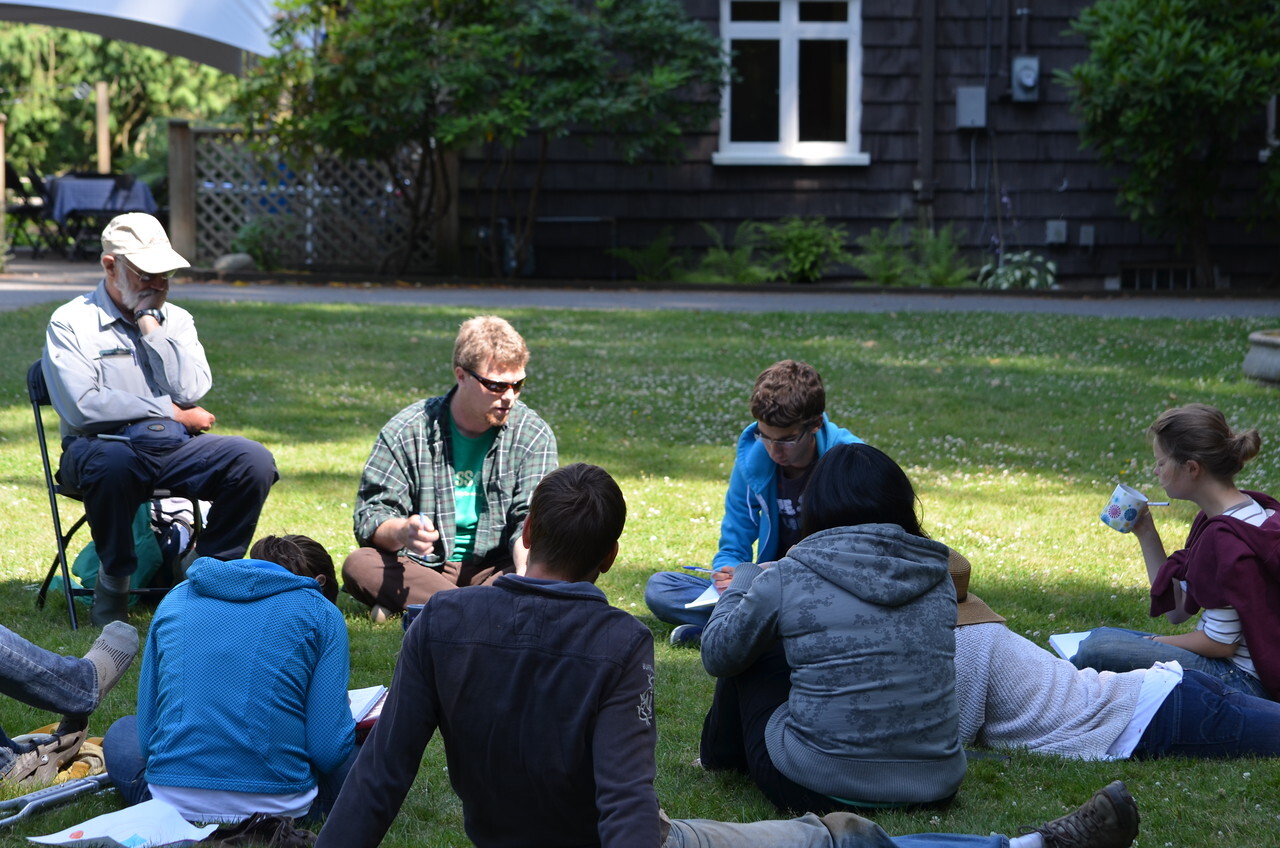
In front of students in their teens and 20s, Humphrey tried to provide what he rarely had when he was younger: a biblical perspective, free from partisan politics, that embraced the scientific consensus around climate change and other environmental issues. The room was packed, and I turned to a young couple behind me, Glenn and Katie, to chat. For two people at a weekend talk on ecotheology, they were pretty skeptical about the subject. “I wouldn’t want my faith to enter my activism, because I’m ashamed of the damage Christianity has caused over the centuries,” Katie said.
Humphrey also harbors his share of doubts. He would be the first to tell you that people have used the Bible to justify horrible acts. But he also thinks that Christians shouldn’t be bystanders to modern ecological calamities, and that the Bible might be used to inspire Christians to care for God’s creation. To illustrate this, he told the students about the story of Naboth’s vineyard.
In the Book of Kings, a man named Naboth was pressured by a wealthy king, Ahab, to sell his land. Naboth refused because the soil provided food for his family, and the land was an inheritance from his ancestors. Ahab’s wife, Jezebel, then set up an elaborate ruse which wound up with Naboth being executed and King Ahab getting the vineyard.
Humphrey described this story as a struggle between a defiant farmer and a military ruler, and he believed this theme of resistance echoed through other biblical stories in which agrarian people, in tune with the land and the seasons, often had to fight powerful Ahabs to protect what they had. He then drew a parallel to modern times, describing how, around the world, land and natural resources are often degraded and commodified by powerful people who put profit before the needs of local communities. “We therefore need, now more than ever, to recover the deep sense of our membership within, and dependence upon, creation,” Humphrey said. “And we need to put this into practice with concrete social and ecological action.”
After he finished, the room buzzed with chatter, and I turned back to Glenn and Katie to get their reaction. This time Glenn chimed in: “You don’t often hear it said in this way, or with a call to action like that.” Similar to Katie, though, he was hesitant about mixing theology with environmental activism, and wondered if pointing to Bible passages for support was the best idea.
“It’s encouraging to know that there are parts of the tradition that can be helpfully appropriated, but you can’t paint the whole Bible with the same brush,” Glenn said. “I think some parts of the Bible are downright problematic. For example, Naboth’s vineyard is an awesome challenge to power, but there are many other instances where people acquiesce to power.”
Some, like Katie and Glenn, might be wary of involving religion in environmental discussions. After all, Christianity and Islam famously battled with science, and deeply religious civilizations destroyed their natural environments. Yet the reality is that religions still shape how a majority of people view the world. Muslims, Christians, and Hindus together represent 5.2 billion people, or two-thirds of the world’s population.
For evangelicals concerned about climate change, questions of morality seem to weigh as heavily as those of science. Humphrey doesn’t only care about nature or creation — the scorched forests and the melting polar ice caps — but also about the human fallout from climate change in the decades ahead: Rising seas destroying the homes of millions around the world, devastating droughts causing millions more to go hungry. He often worries about how people will respond when confronted with this version of the future.
“What sort of people will we be if the CO2 in the atmosphere isn’t easy to fix? What sort of people will we be if things get hard, like scary hard?” Humphrey asked me. “What will hold us capable of living lives of justice and love and goodness for the vulnerable, once the illusion of safety and affluence slips?”
Humphrey, at least, thinks the Christian church can help answer these moral questions. For others, it could be Islam, Judaism, or another religion. As climate change inflames divisions in society, people like Humphrey believe the response requires not just solar power, electric cars, and mass transit, but also teachings of love, prayer, and forgiveness.
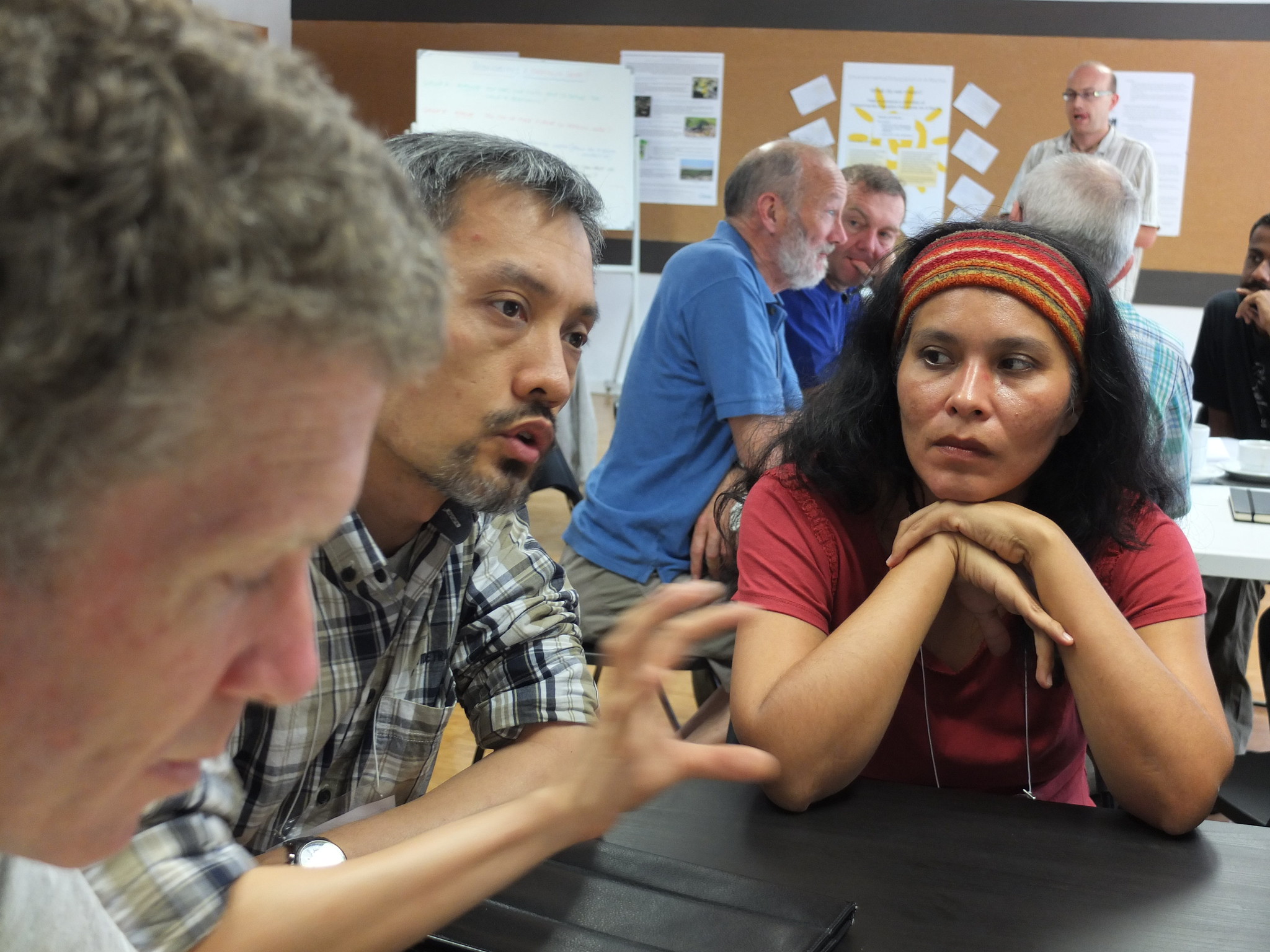
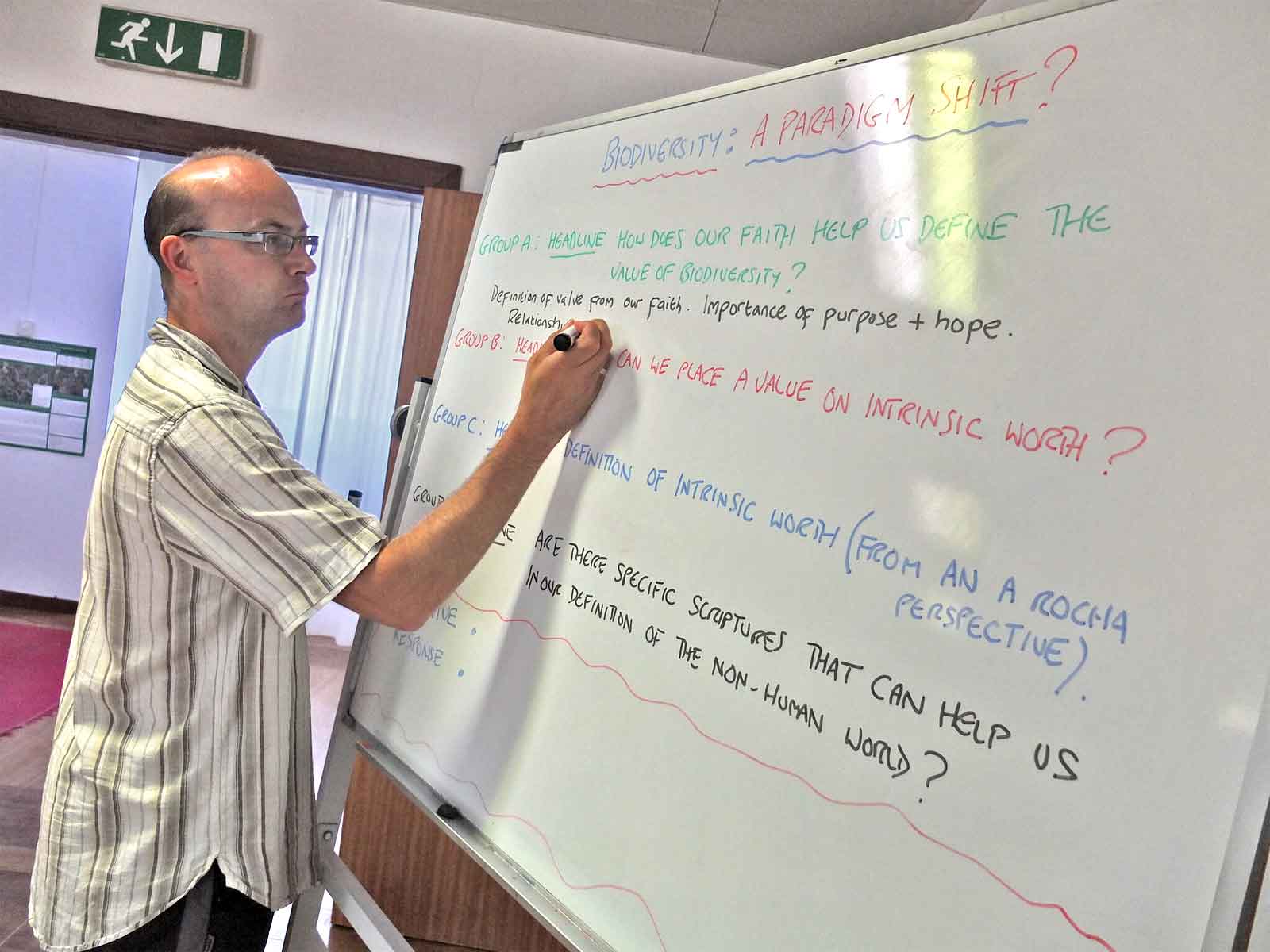
A Rocha volunteers discuss ideas and strategies at a 2015 A Rocha Leader’s Forum held in Portugal (left). During the same forum, a volunteer takes notes during a brainstorm on religion and biodiversity (right). Photos by Melissa One / A Rocha International.
It was in this spirit that more than 70 Christian leaders, climate scientists, and government officials gathered in 2002 at the University of Oxford to discuss the threat of global warming and how to reconcile their response with Christian imperatives, as Katharine Wilkinson described in her book, Between God and Green. Drawing on both science and ecotheology, they produced the “Oxford Declaration on Global Warming.” It urged Christians to confront climate change, for scientific reasons as well as moral ones. After all, the effects of climate change, like severe drought, storms, and rising sea levels, disproportionately hurt the world’s poor. To “love thy neighbor as thyself,” they reasoned, should also mean to help them.
This shift in thinking and growing public concern for the environment opened the way for the Evangelical Climate Initiative and its 2006 “Call to Action.” Similar to the Oxford Declaration but with a focus on evangelicals, the “Call to Action” brought formerly reluctant evangelical leaders together over climate change. The statement acknowledged that they took a while to accept the seriousness of the crisis, but ultimately they were “convinced that evangelicals must engage this issue.”
Megachurch pastors with tens of thousands of followers, like Joel Hunter and Rick Warren, pastor of Saddleback Church, soon signed on. This evangelical movement has faced a backlash from many congregations across the country, and it hasn’t broken the connection between climate-denying Republicans and most evangelicals, but new ways of thinking have taken root.
With an audience of billions, pastors like Hunter and Warren, along with priests, imams, and rabbis, could be powerful advocates for climate action. In a 2016 essay, two religious scholars at Yale University, Mary Evelyn Tucker and John Grim, considered the role of religious leaders in spurring social change over recent decades, whether in movements for civil rights or in advocating for the poor. “Although the world religions have been slow to respond to our current environmental crises, their moral authority and their institutional power may help effect a change in attitudes, practices, and public policies.” they wrote. Tucker and Grim, a married couple who founded the Forum on Religion and Ecology at Yale, then issued a challenge: “The individual religions must explain and transform themselves if they are willing to enter into this period of environmental engagement.” They concluded that, if this is done, religions could “empower humans to embrace values that sustain life and contribute to a vibrant Earth community.”
Part of this engagement, Hayhoe argues, involves nurturing a sense of hope. In 2017, the American Psychological Association first defined the term “eco-anxiety” as a “chronic fear of environmental doom,” and it’s on the rise. In a survey of British schoolchildren last year, one in five reported having nightmares about climate change. Many can relate: Just staring at charts of rising global temperatures can engender a sense of dread. In her 2018 TED talk, viewed 4 million times, Hayhoe described the consequences of giving in to despair, a gloom that leaves people paralyzed. “Fear is not what is going to motivate us for the long-term, sustained change that we need to fix this thing,” she said.
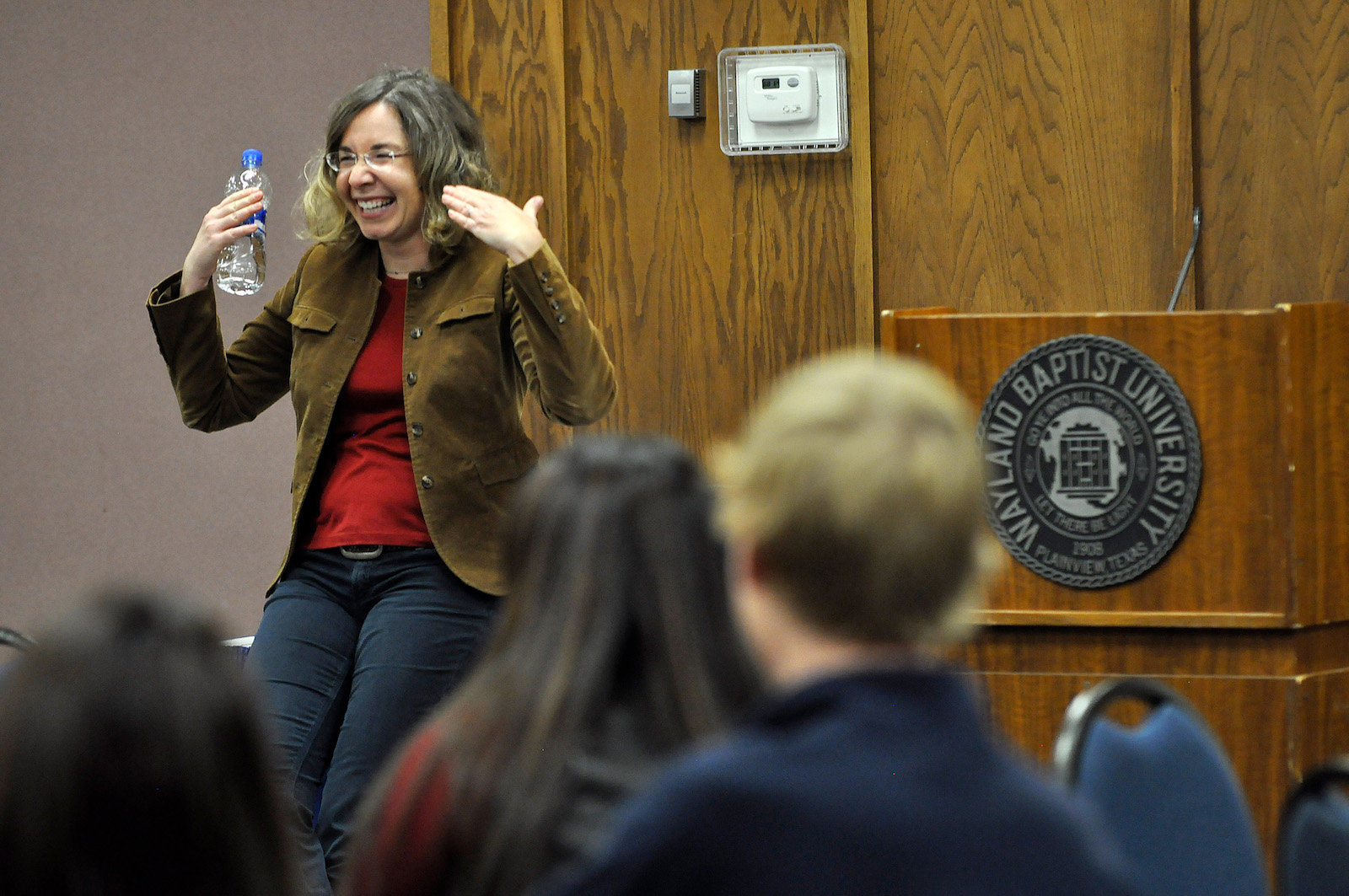
When I talked to her, Hayhoe was adamant that nurturing hope can be as simple as getting out and doing something. “We know that what gives us hope is action, whether it’s seeing others act, hearing about others acting, or acting ourselves.”
Humphrey, for instance, has continued working with A Rocha, focusing on theological education, but he has also, along the way, become an ordained minister. He now lives and preaches in Victoria, British Columbia, and with a group of friends, he founded the Wild Church Victoria. On weekends, members hike local mountains, through grasses and Garry oak forests; or they visit nearby beaches and walk along pebbled shores. Outside in nature, surrounded by creation, they read scripture and practice their eco-conscious faith.
It was at Brooksdale where I saw A Rocha’s efforts to put creation care into practice. Along the Little Campbell River, which runs through the property, the Salish Sucker, a small, freshwater fish once thought locally extinct, was rediscovered thanks to A Rocha’s watershed monitoring. This blend of science, conservation, and Christian faith seemed so at odds with the popular conception of anti-environment evangelicals.
“A Rocha beautifully embodies how we can care about people and places in a way that genuinely reflects God’s love,” Hayhoe told me. “I think that genuine reflection of love is what attracts people to them.”
Back when I first spent time with Humphrey, riding in his truck through forests near the U.S. border, he drove us to a lumber yard to buy slabs of wood for an outdoor shelter. When we returned to the Brooksdale farm, the cedar planks jutting from the back of the truck, the property’s large garden and grassy fields came into view, ringed by a forest of tall conifers and a gentle, meandering river.

Perhaps this proximity to nature, along with the experience of growing food and protecting wild species, helps raise awareness about the threat of climate change and the destruction of the natural world. This is hardly a novel idea, as a growing body of evidence shows that connection with nature is linked to a desire to protect it. But in an era when our eyes are glued to the mini-computers in the palms of our hands, contact with nature, a fact of life for millennia, can seem radical.
For the next couple of hours at Brooksdale, I stuck around to help build the shelter for their outdoor oven. The sound of a radial saw slicing through beams of wood filled the air. We were soon drilling nails into rafters and attaching them to boards that ran along the shelter’s peak. By the fifth or sixth board, we had the hang of it, and fell into a routine of eye contact, head nods, and reassurances of “good enough.”
Humphrey told me that A Rocha didn’t have a church. But it seemed to me that here, at Brooksdale, the volunteers were constructing a place of significance surrounded by nature: a large wooden shelter around an oven hearth, where food grown in the fields would be cooked, in acknowledgment of Earth’s wonder, the fish and the birds. What they call creation.




